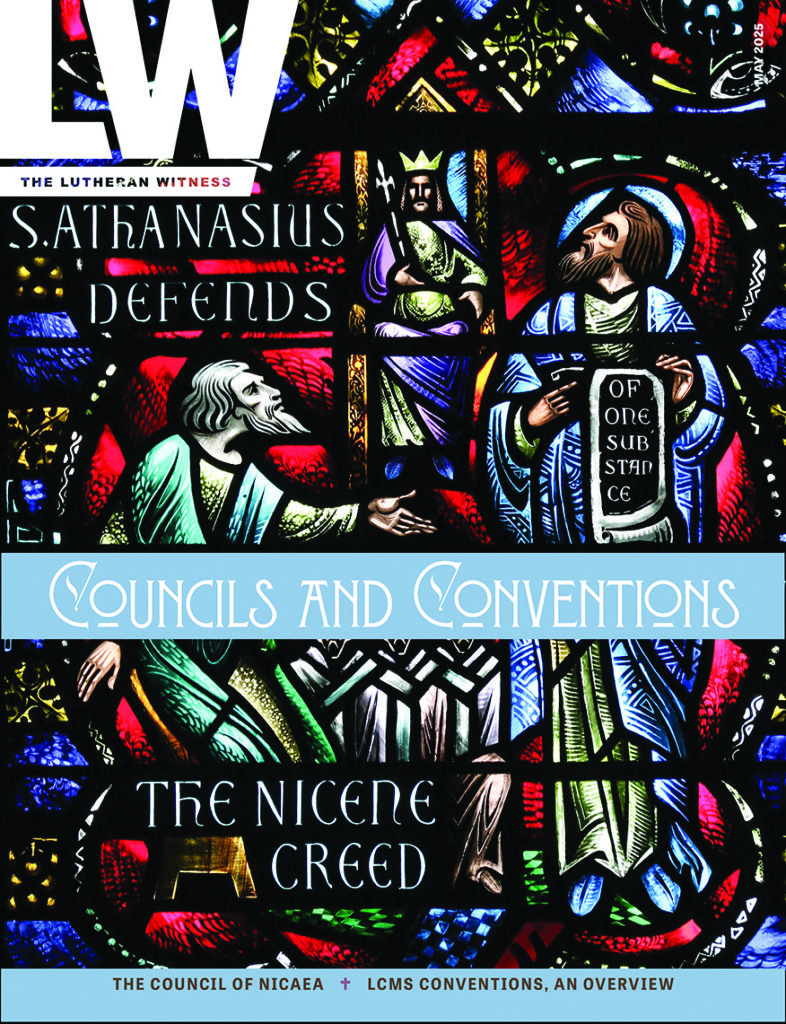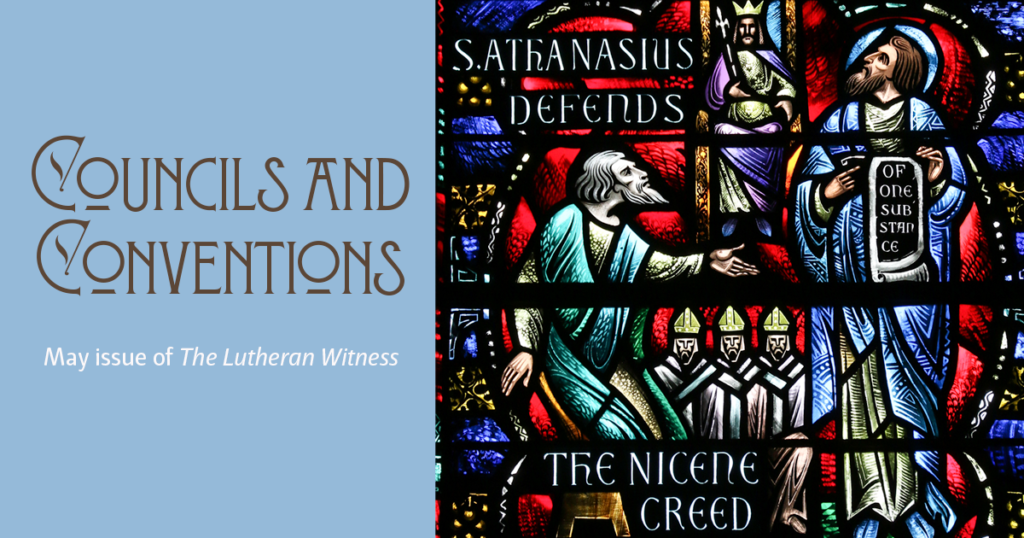
The May issue of The Lutheran Witness, “Councils and Conventions,” recognizes the 1700th anniversary of the Council of Nicaea and discusses our own LCMS conventions.
- From the President: Very God of Very God: The Nicene Creed’s Faithful Testimony
- Life in the Church Year Series: Eastertide: Lamb Cake and Ascension Picnicking
Features:
- The Council of Nicaea: How the Early Church sought unity with the help of an emperor — Joel Elowsky
- The Nicene Creed: Biblical foundations — Jonathan Mumme
- Early Church Councils and the Confession of Christ: What did these councils teach, and how do Lutherans view them? — Charles P. Arand
- LCMS Conventions, an Overview: How LCMS congregations govern their Synod and districts through conventions — John W. Sias
- Uprooting False Doctrine in 1857: A moment in convention history — Benjamin T. Ball
- Gathering in Time of War: A moment in convention history — Mark J. Bliese
- Defining Convention’s Authority in 1973: A moment in convention history — Lawrence R. Rast Jr.
Departments:
- Snippets: News from around the LCMS and the world
- Worship: The Creed in the Divine Service
- Formula of Concord Reading Plan: May — Law & Gospel
- Searching Scripture: Opening the Old Testament: Isn’t That Typical?
From the editor:
Seventeen hundred years ago this month, in May of A.D. 325, bishops from across Christendom gathered for the first official council in the history of the young Christian church.
The Council of Nicaea met to define right teaching about the nature of Christ and His relation to God the Father. They also settled other, smaller matters causing disputes in the church. From this council and a later one came the Nicene Creed, which we still confess in our churches today.
Were this council and this creed necessary? The Word of God and the faith taught by the apostles had been sufficient for 300 years — why add to them further theological statements and new terminology?
The Council of Nicaea and the Nicene Creed did not, in fact, add anything to Scripture’s testimony — they applied it to new questions. Through careful attention to the Word of God and churchwide theological discussion, church leaders laid out decisive answers to false teachings that had arisen in their day, which were leading many astray and sowing discord. God worked through His church amid these controversies to provide a clear, faithful confession about Himself, which has kept the church moored across the ages since.
In a similar way, God worked through Martin Luther and the 16th-century Reformation — and the Lutheran Confessions that codified their teachings — to respond to false doctrine in the church and to present definitive statements of scriptural teaching. These Confessions keep us moored in God’s Word still today.
The Council of Nicaea handled many smaller matters of business alongside the grand theological questions — just as our own LCMS conventions do. In addition to articles on the history of the Council of Nicaea (p. 8), the biblical foundations of the Nicene Creed (p. 11), and the Lutheran view of church councils (p. 16), this issue marks the 1,700th anniversary of Nicaea with several articles on LCMS conventions: how LCMS congregations govern their Synod and districts through them (p. 18), and a few accounts of notable moments in convention history (pp. 20–23).
As we reflect on the history of the church and her life together this month and as we continue through district convention season to prepare for the 69th Regular Convention of the LCMS next July, let us heed the encouragement of our Synod’s Secretary Rev. Dr. John W. Sias, who writes, “We would be fools to believe that there is nothing out of joint in our Synod today. We need the Word of God to work on us all, to work in love at convincing one another of the truth. God grant that our conventions above all address these matters, after the example of the apostolic church. … May our conventions be [Christ’s] instrument, the Word of God reigning in them over us, and all our people doing together the hard work that calls for, and serves, faith” (p. 19).
Soli Deo Gloria,
Stacey Eising
Managing Editor, The Lutheran Witness




